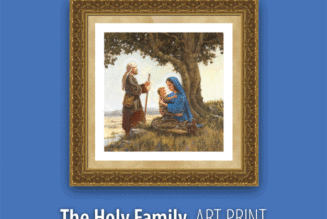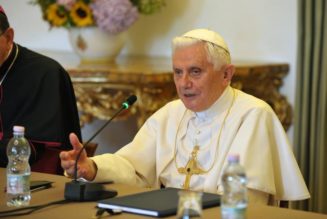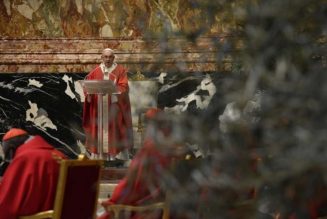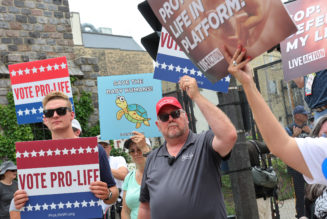By Dr. Jeff Mirus ( bio – articles – email ) | Jul 26, 2024
In the United States, we are entering the quadrennial silly season in which far too many of us waste a great deal of time, energy and money following politics and attempting to influence the outcome of Presidential elections. Sometimes, of course, there are better reasons to do this than at other times, but as a general rule the party which has won these elections has had surprisingly little impact on the steady spiritual and moral decline throughout American history, and especially since the end of World War II.
What typically happens at this time of year is that we convince ourselves (against repeated evidence to the contrary) that a narrow victory by one side or another in our two-party system will result in substantial gains for the nation, even though the overall moral and cultural trajectory, in most relevant senses, consistently continues to be a downward spiral. It is certainly a fact of the American two-party system that platforms and candidates have to move toward the perceived middle of the prevailing culture to get elected. They also have to run wildly expensive campaigns backed by seriously wealthy people, who (as a general but not certain rule) are wealthy in large part because they also know how to play effectively to the prevailing culture. And it is also necessary to whip voters into a frenzy of concern to collect the endless smaller donations which fund the various campaigns.
This, by the way, reveals the fundamental fallacy of democratic systems: They always depend on the dominant culture, regardless of whether that culture is bad or good. A democratic system, almost by definition, cannot steer or guide a culture; it simply continues the prevailing cultural drift. Even Catholic leaders today seem incapable of proposing a coherent political model, with their constant emphasis on the superiority—and even the absolute moral necessity—of democracy, as if the mantra of “one person one vote” has not always been a clear recipe for politically capturing the current state of each declining culture. Too often, in other words, even Catholic leaders speak and act as if it doesn’t matter that their constant praise of democracy is the quickest way to undermine whatever cultural values the Church herself ought to be advocating in the name of Christ.
Political time, energy and resources
The best political system is always the one that produces the best rulers, but of course this varies constantly. For centuries, the general Catholic view was that monarchy is best because it mirrors God’s own form of governance. Nobody can improve a country faster than a good monarch, but nobody can send a country into a nosedive faster than a bad one. Today the general Catholic view tends to be that democracy is best because it recognizes the inherent dignity of each adult as having a right to political participation. But there is a huge confusion about the value of the vote: The result of universal suffrage has generally been to atomize the electorate into a collection of single actors, to use this “political exaltation” as a way of stripping away intermediary institutions, creating a situation in which millions of weak and politically isolated individuals are placed at the mercy of the modern bureaucratic state.
The most important lesson we can learn from the modern political experience is that it is a gigantic fallacy to make everything “political” and then reduce everything to “the vote” or the “democratic process”. It is precisely this fallacy that strips away the intermediary institutions which are actually capable of bringing socio-political, economic, and spiritual pressure to bear for the common good. These institutions have varied widely over the centuries—grange associations, trade unions, schools and universities, villages and towns, business associations, guilds, churches and the Church (an intermediary institution in the temporal order, though far more than that in the moral and spiritual order). These are all the institutions through which ordinary people in ordinary communities of various types organize their affairs and achieve a healthy influence over those affairs, rather than reducing everything to one person and one vote against the overwhelming power of the bureaucratic State.
The even larger fallacy underlying our quadrennial silly season in America is the fallacy that politics is the most important activity for building a good society. It is difficult for anyone who has studied modern history to hold this view, because of the massive evils that have been perpetuated under the influence of political ideologies. It ought to be self-evident that the most important activity for building a good society is cultural formation, and that the best possible formator of human culture is Jesus Christ. It goes without saying, of course, that each historical period has its own crises, and that the best tools to use to resolve these crises will vary with the possibilities. But as a general rule, it is far, far more important to devote time, energy and resources to the Christianization of a culture—that is the Christian conversion and instruction of the people who make up a particular human culture—than to devote our time, energy and resources to the outcome of presidential elections.
Evangelization over politics
Now I do not wish to be misunderstood. Each of us is called to work in the vineyard of the world in different ways, and some are certainly called to political action. But as a matter of true prudence, it is typically and perennially far more important to bear Christian witness and to contribute in various ways to what is sometimes called the New Evangelization than to pour time, energy and resources into politics every four years in the excitement of pursuing the ”big chance” which is rarely much of a chance at all, no matter who wins. This should be especially obvious this year, in which the Republican Party has “read the room” and decided that to win elections it needs to cater to the prevailing moral dissolution by refusing any longer even to maintain the fiction of being pro-life.
But in America today, it ought to be obvious also that the greatest fiction of all is the fiction that separation of Church and State means the separation of politics from religion—which is just another way of confirming our prevailing cultural belief that religion is merely a personal sentiment to be permitted only as a kind of comfortable feeling, and never as a call to public action. This alone shows how far behind we Christians are in the formation of culture through a serious understanding of the need for personal conversion. For the first rule of cultural formation is that a healthy culture must be in touch with reality, and that human persons can get in touch with reality only through the recognition of what the Creator has revealed to us, first through natural law, and second through a specific Revelation guaranteed by signs and wonders that far exceed the power of even the modern secular State.
So please, this year, let us not go through another exercise in grasping at the straws slipping out of the straw men and women who are so ready to turn America into the promised land through yet another largely useless Presidential election. Messianic politics is not and never will be the road to glory. Escaping the quadrennial silly season in American politics is a small but significant way to recognize reality. Of course we must do the best we can in every aspect of our lives, but the two-party system in America is not the source of our redemption.
Let us dampen our political expectations. Let us shy away from political euphoria. And let us put the bulk of our energies elsewhere. Christian conversion is and will always be the key, both here and hereafter. For only Christ saves.
Sound Off! CatholicCulture.org supporters weigh in.
All comments are moderated. To lighten our editing burden, only current donors are allowed to Sound Off. If you are a current donor, log in to see the comment form; otherwise please support our work, and Sound Off!

There are no comments yet for this item.










